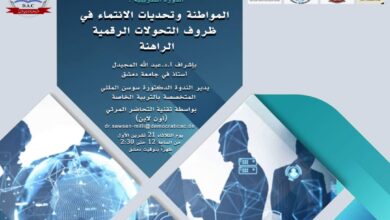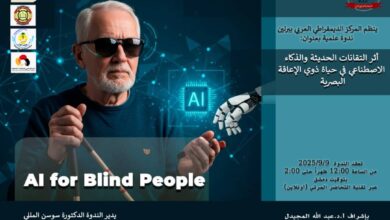Online Intercultural Exchanges Education

Collective Book
Authors are invited to contribute to this collective book, which seeks to promote intercultural communication and interaction thereby establishing a scientific community of researchers spanning the Atlantic to the Gulf. Furthermore, coping with common civilisation challenges and future visions in the light of ongoing changes. Researchers and academics will be offered the opportunity to present their results to a wide audience.
This book will be released in Germany, with the writers’ names and a serial number accredited by the #Democratic_Arab_Center. All authors will receive a certificate of publication
Online Intercultural Exchanges Education
Project Director : Dr. Assia Baghdadi – Mohamed bou diaf University of M’sila
The Rationale
Over the last two decades, online intercultural exchanges have become a growing subject of research in the field of learning technologies and English Language Teaching (ELT). As hardware, software, and the internet have developed, so too have research approaches, learning theories, and classroom practice in this area. Accordingly, Learners can now engage in informal online exchanges outside the classroom by pursuing their own preferences and hobbies in the target language due to increased access to online communities ; and teachers are increasingly able to link learners in various parts of the world with the advent of networked computers , with the dual goal of enhancing linguistic competence and developing intercultural knowledge and skills. However, the effectiveness of an online (inter)cultural exchange project is determined by the pedagogical framework and task design—in other words, the technology’s principled pedagogical implementation—as well as relevant contextual and institutional factors.
In this regard, this International Collective Book is intended to afford foreign language educators, practitioners, and culture researchers the opportunity to introduce, discuss, and promote the exchange of their theoretical and empirical findings and expertise regarding online intercultural exchange pedagogy in a variety of perspectives. This, of course, by focusing its scope on innovative research intended to bolster L2 learners’ intercultural communicative competence that is indispensable to cope with the communication demands in the globalized era.
Objectives
- Identification of intercultural exchanges
- Bringing to light researchers’ findings regarding intercultural exchanges integration in education.
- Provision of insights and perspectives on intercultural exchanges
- Highlighting the importance of intercultural exchanges in a globalized era.
Related Themes
Any paper that is either of direct or indirect relevance to the following issues is wolcome
- Globalization and the role of Online intercultural exchange
- Online intercultural exchange Vs Alienation
- Online intercultural exchange and communicative competence
- Innovative teaching methods using online intercultural exchange
- Blended-learning courses using classroom-based learning and online intercultural exchange
- Learner autonomy and online intercultural exchange
- Innovative approaches to assessing online intercultural exchange
- The Use of Translation in online intercultural exchange
The Scientific Committee
- Pr. Linda BELABDELOUAHEBE-FERNINI. M’sila University.
- Dr. Salima MAOUCHE. Béjaya University
- Dr. Laadjel Karima. Djelfa University.
- Dr. Abou Baker Hamoudi. M’sila University.
- Dr. Bava Harji Madhubala . Faculty of Applied Communication Multimedia – University Jalan Ayer Keroh Lama, Bukit Beruang – Melaka, MALAYSIA
Editorial Policy
- Articles should report on original research or present original content that links to above mentioned topics .
- A cover letter should accompany the manuscript with a short Bio of the author
- Full-length articles should be no more than 10,000 words in length, including references and appendices, and should include an abstract of no more than 250 words. Decision as papers will be accepted or not depends on reviewers’ comments as well as the quality of the manuscript itself.
- The manuscript should follow APA Editorial Style;
- The manuscript title should be concise (preferably fewer than 10 words) and adequately descriptive of the content of the article;
- The abstract should be written so as to provide the substance of the full paper;
- The manuscript should be in English;
- The manuscript should conform to the proposed template.
- The paper should be based on rigorous academic standards;
- The paper should be clearly written and well organised.
- The topic should be highly significant, breaks new ground, and provides a foundation for future research;
- The rationale for the paper should be well grounded; and based on a known theory or on an interesting issue;
- The research methodology for the study should be appropriate and applied properly;
- The material of the paper should be technically accurate and sound;
- Discussion of the results should be based on analysis of data;
- Results should not be overstated or overgeneralized;
- Implications and recommendations should be relevant and useful.
Disclaimer
All the articles published in this collaborative book do not represent the views held by the editor and members of the editorial board. Authors are responsible for all aspects of their articles except editorial formatting.
Important dates
- Full paper submission deadline: 01/05/2021
- Notification of acceptance date : 15/05/2021
Authors should upload the template file – Article template
Democratic Arab Center For Strategic, Political & Economic Studies
Deutschland – Berlin
030- 54884375
030- 91499898
030- 86450098
Continue on the Viper-Whats App : 00491742783717




